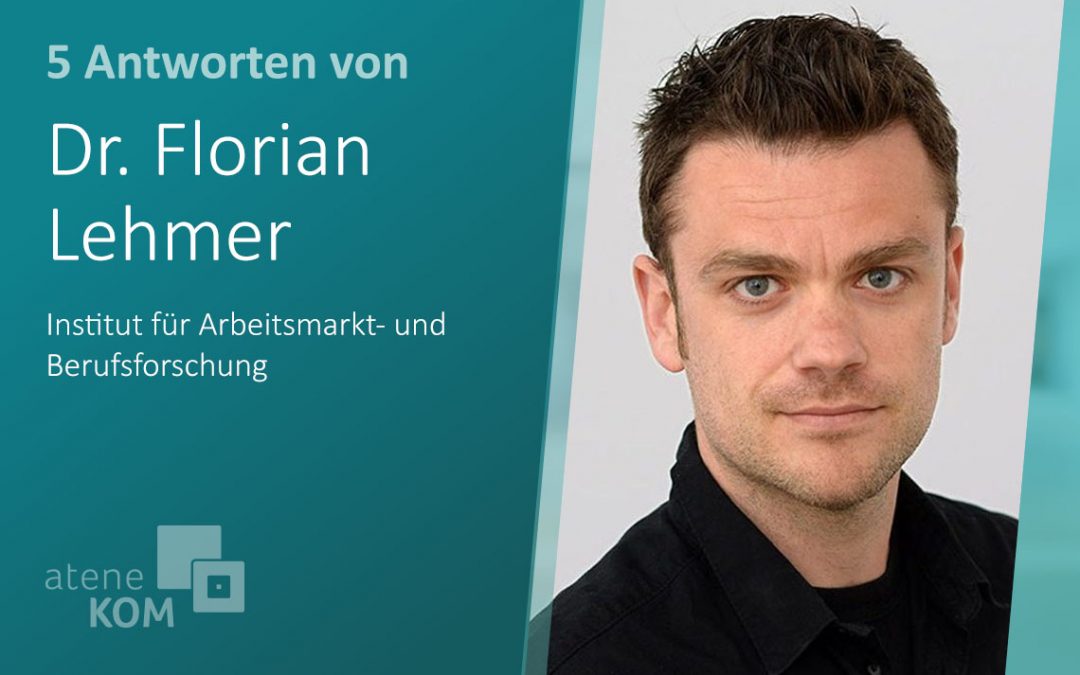For the world of work, digitalization primarily means a higher degree of networking – between people, machines and companies. Agile project groups are already working internationally, virtually and networked today. What will the next stage of development in the world of work look like? In an interview with aconium GmbH, Dr. Florian Lehmer, head of the “Work in the digitalized world” working group at the Institute for Employment Research (IAB) of the Federal Employment Agency, spoke about the current and future effects of technological change on work.
aconium: In which areas of the world of work is technological change most noticeable today – and in which is it least noticeable?
Dr. Florian Lehmer: Basically, it can be said that service providers are more networked than industry. Service providers in the information and communication technology sector, which are already involved in digital topics, are at the forefront, as are architectural firms, legal and tax consultants and management consultants. In contrast, we see a low level of networking in the construction sector and among small craft businesses. In general, large companies are better connected than small businesses and the level of digitalization is higher in cities than in rural regions. This has to do with the existing digital infrastructure. Where fast internet is already available, companies are also more likely to introduce digital working methods. The ongoing infrastructure expansion motivates companies to work more digitally. You could say that fast internet forms the basis for the further development of the world of work.
aconium: What will work look like in the digitalized world of the future?
Dr. Lehmer: Humans and robots are already working together today – and this will happen even more in the future. Machines will take over the physically hard work. We are already seeing this in logistics and manufacturing. Human tasks are shifting away from physical activities such as lifting, moving and processing materials or products towards operating and monitoring robots. This increases our productivity. Overall, we will work more flexibly in terms of space and time in the future – and thus ideally more creatively and freely. Machines will then take over repeatable tasks and routines. One example: in future, radiologists will no longer have to evaluate X-ray images themselves – an algorithm will do that. The radiologist will have much more time to draw conclusions from the analyses provided and explain the examination results to the patient. This means that we will work more analytically, creatively and interactively in the future.
aconium: What major challenges do employees and employers face with regard to a digitalized world of work?
Dr. Lehmer: Even today, training and studies are no longer sufficient for a whole working life, because the world of work and the challenges it presents are changing ever faster. Employers need to keep their employees qualified. Further training and lifelong learning will therefore become increasingly important in the future in order to keep pace with technological developments.
aconium: How do you think these challenges can be overcome?
Dr. Lehmer: My personal impression as a labour market researcher is that the education system is facing major challenges – and we all know that. In order to prepare children to cope in the digital world of tomorrow, it is not enough to give pupils laptops. New digital skills need to be taught. This includes, for example, being able to distinguish fake news from true reports or being familiar with the topic of data protection. After school comes training or studies and even after that, employees need to continue learning. Training their own employees is a particular challenge for smaller companies.
aconium: What would you like to see in an optimally digitized working world?
Dr. Lehmer: I would like to see a humane working world without mindless and physically demanding work, where we have more freedom. Then employees can decide for themselves when, where and how they work. There should be flexibility in the world of work that does not harm employees, but rather benefits them. To summarize: I would like us to simply work better.
You can find more information on the topic of work of the future in the dossiers on digitalization from aconium GmbH:

